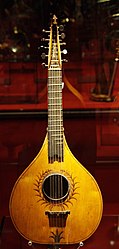
Back Woidzither BAR Цыстра BE Цистра Bulgarian Cistre Catalan Cister German Cistro EO Cistro Spanish Sisteri Finnish Cistre French Siotaran GA
 Cittern exhibited at the Music Museum of Barcelona | |
| Other names | Fr. cistre, It. cetra, Ger. zitter, zither, Sp. cistro, cedra, cítola |
|---|---|
| Classification | String instrument (plucked) |
| Hornbostel–Sachs classification | 321.322-5 (necked box lute, plucked with fingers) |
| Developed | 16th century |
| Related instruments | |
The cittern or cithren (Fr. cistre, It. cetra, Ger. Cister, Sp. cistro, cedra, cítola)[1] is a stringed instrument dating from the Renaissance. Modern scholars debate its exact history, but it is generally accepted that it is descended from the Medieval citole (or cytole). Its flat-back design was simpler and cheaper to construct than the lute. It was also easier to play, smaller, less delicate and more portable. Played by people of all social classes, the cittern was a popular instrument of casual music-making much like the guitar is today.
- ^ Chisholm, Hugh, ed. (1911). . Encyclopædia Britannica. Vol. 6 (11th ed.). Cambridge University Press. pp. 399–400.